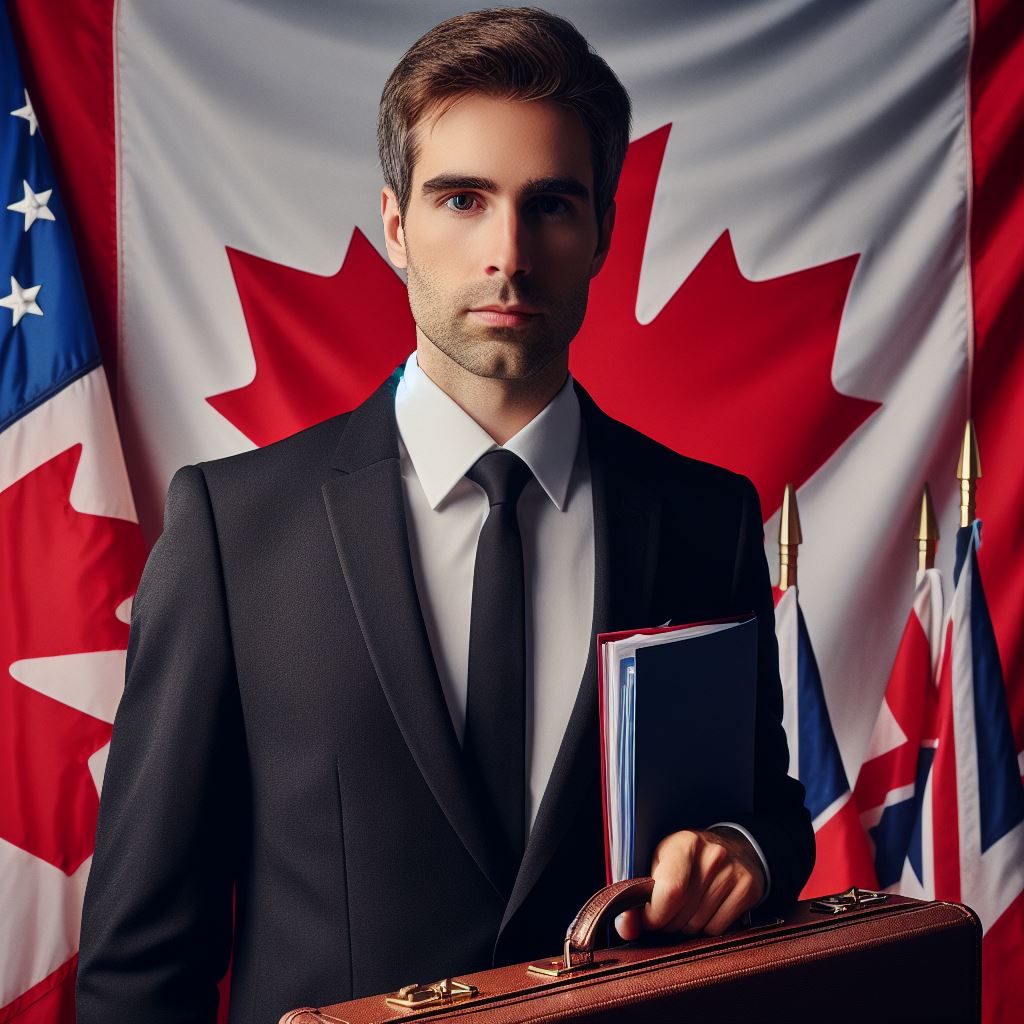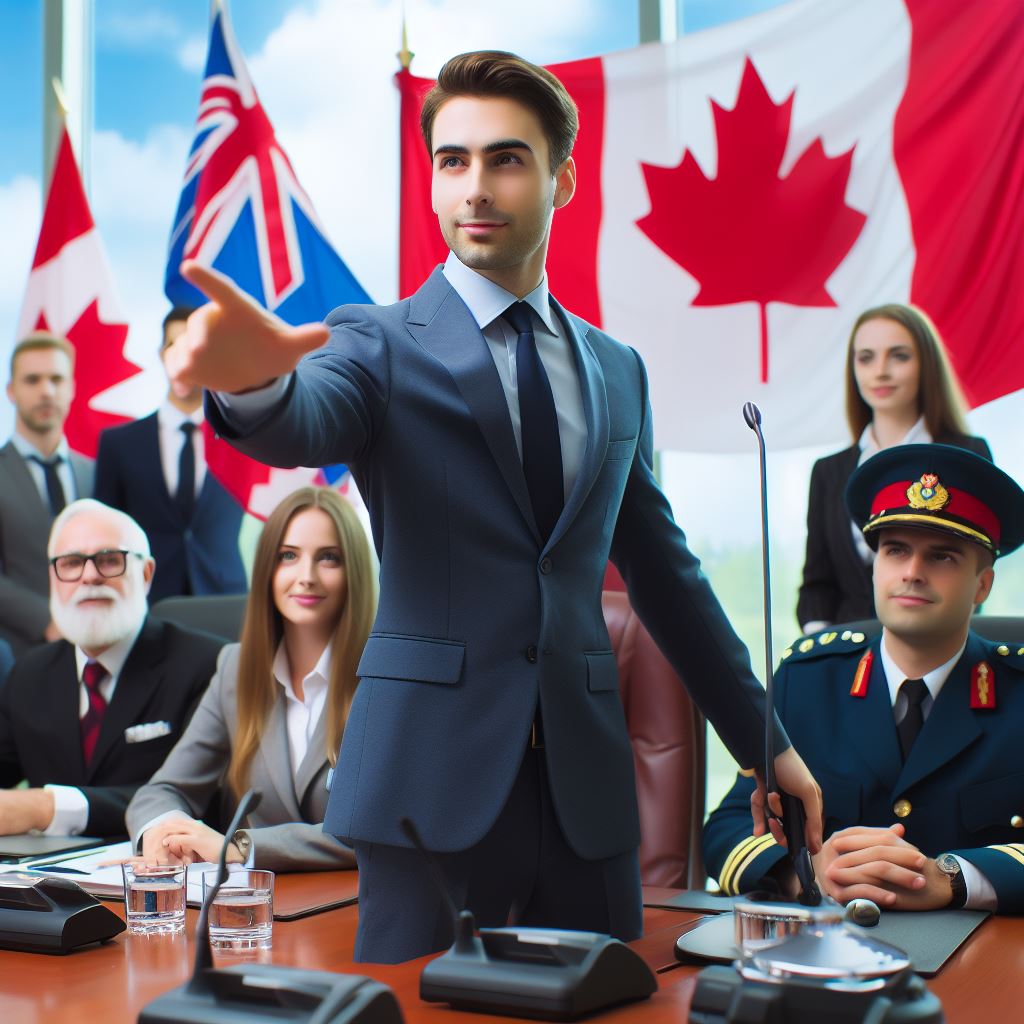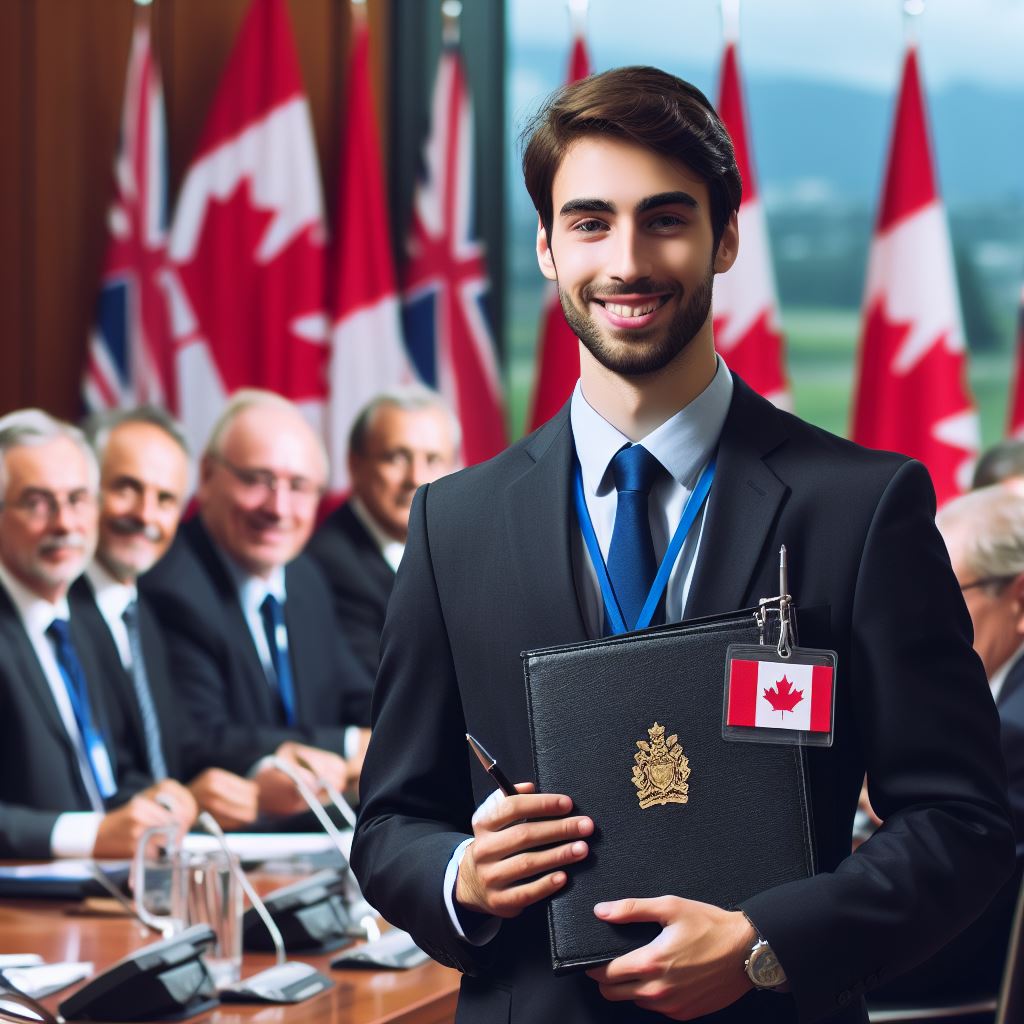Introduction
Diplomacy, the art of conducting negotiations between nations, is an essential aspect of global politics.
At the heart of diplomacy are diplomats, individuals who represent their countries in international relations.
They act as intermediaries, tasked with fostering communication and promoting the interests of their nations.
Diplomats are vital in global politics for many reasons. Firstly, they serve as diplomatic channels, facilitating dialogue and negotiations between different countries.
Through diplomatic exchanges, diplomats foster understanding and seek mutually beneficial agreements.
This diplomatic engagement can defuse tensions, prevent conflicts, and promote peace.
Secondly, diplomats play a key role in representing their country’s interests abroad.
They engage in information gathering and analysis, providing valuable insights to policymakers.
By understanding the perspectives and positions of other nations, diplomats can effectively advocate for their country’s stance, whether in matters of trade, security, or human rights.
Furthermore, diplomats act as cultural ambassadors, promoting cultural exchange and understanding.
They organize public diplomacy events, showcasing their country’s traditions, arts, and values.
These interactions can bridge cultural gaps and foster positive bilateral relationships, enhancing cooperation on various global issues.
In addition to their diplomatic functions, diplomats also engage in multilateral diplomacy.
They participate in international organizations, such as the United Nations, where they collaborate with diplomats from around the world to address global challenges collectively.
In short, diplomats are essential actors in global politics.
Their role goes beyond simple representation; they are promoters of dialogue, facilitators of negotiations, and cultural ambassadors.
Through their efforts, diplomats contribute to peaceful international relations and the resolution of global issues.
Historical background of diplomacy
Ancient origins of diplomacy
Diplomacy, in its most basic form, has existed since ancient times, dating back to the earliest civilizations.
The need for communication and negotiation between different groups of people was necessary for peaceful coexistence and the resolution of conflicts.
In ancient Mesopotamia, around 2400 BCE, city-states engaged in diplomatic efforts to maintain alliances and secure favorable trading agreements.
They sent emissaries to negotiate with neighboring kingdoms and establish diplomatic relationships.
Egypt, one of the most powerful civilizations in ancient history, also practiced diplomacy.
They relied on royal envoys known as Pharaoh’s representatives to negotiate peace treaties, establish diplomatic ties, and ensure friendly relations with other nations.
The ancient Greeks, particularly during the time of Alexander the Great, made significant contributions to diplomatic practices.
They established embassies, exchanged gifts, and employed diplomats to negotiate with foreign powers, spreading their influence across vast territories.
Unlock Your Career Potential
Visualize a clear path to success with our tailored Career Consulting service. Personalized insights in just 1-3 days.
Get StartedEvolution of diplomacy throughout history
As civilizations advanced and societies became more complex, diplomacy evolved to meet the changing political landscape.
The Middle Ages marked a significant shift in diplomatic relations.
European rulers established permanent embassies, and the concept of modern diplomacy began to take shape.
During the Renaissance, diplomacy became even more sophisticated.
Treaties and alliances between nations became more common, marking the formalization of diplomatic practices.
Ambassadors were appointed to represent their governments and engage in negotiations on various issues.
In the seventeenth and eighteenth centuries, the modern system of diplomacy emerged.
The Peace of Westphalia in 1648, which ended the Thirty Years’ War, established the principles of sovereignty and non-interference in the internal affairs of other nations.
This laid the foundation for the development of diplomatic norms and practices that still exist today.
The nineteenth century witnessed a further expansion of diplomacy with the emergence of nation-states.
Diplomats played a crucial role in maintaining balance of power, negotiating territorial disputes, and solidifying colonial conquests.
The twentieth century brought significant changes to the diplomatic landscape.
The formation of international organizations such as the United Nations provided a platform for diplomacy at a global level.
Diplomatic efforts focused on conflict resolution, humanitarian aid, and promoting international cooperation.
In recent times, diplomacy has adapted to new challenges and opportunities presented by globalization and technological advancements.
Diplomats now engage in multilateral negotiations on issues such as climate change, trade agreements, and human rights, reflecting the complex nature of global politics.
In fact, the historical background of diplomacy showcases its importance in the development of global politics.
From ancient times to the present day, diplomats have played a pivotal role in fostering peaceful relations, resolving conflicts, and shaping international cooperation.
The evolution of diplomacy highlights the continuous need for effective communication and negotiation in an ever-changing world.
Read: Day in the Life of a Canadian Diplomat Abroad
Roles and responsibilities of diplomats
Diplomats play a crucial role in global politics.
They are representatives of their respective home countries, tasked with advancing national interests and promoting national values and culture.
Their functions extend beyond mere representation to encompass negotiation and conflict resolution, as well as economic diplomacy and information gathering.
Representation of their home country
As representatives of their home countries, diplomats are responsible for advancing national interests.
This involves advocating for their country’s political, economic, and security concerns on the global stage.
Diplomats act as advocates, persuading other nations to support their own country’s positions and policies.
Furthermore, diplomats serve as ambassadors of national values and culture.
They promote their country’s cultural heritage, traditions, and way of life, fostering understanding and goodwill between nations.
This cultural diplomacy helps build relationships and connections on a people-to-people level.
Negotiation and conflict resolution
In addition to representation, diplomats play a crucial role in negotiation and conflict resolution.
They engage in diplomatic talks and negotiations, striving to find mutually beneficial solutions to international disputes.
Through skilled diplomacy, they work towards peaceful resolutions, preventing conflicts from escalating and finding compromises that satisfy multiple stakeholders.
Diplomats also act as mediators in resolving international disputes.
They facilitate dialogue between conflicting parties, helping them find common ground and reach agreements.
By offering neutral and unbiased assistance, diplomats contribute to the maintenance of peace and stability in the international arena.
Economic diplomacy
Economic diplomacy is another vital aspect of a diplomat’s role.
They promote trade and investment opportunities to enhance their country’s economic interests.
By fostering economic relations with other nations, diplomats contribute to the growth and prosperity of their own country and those with whom they engage.
Gathering and analyzing information
Furthermore, diplomats are instrumental in gathering information and analyzing political, economic, and social trends.
They collect intelligence on various issues, such as foreign policies, security threats, and global developments.
This information is crucial for policymakers and helps guide decision-making at the national level.
Additionally, diplomats analyze political, economic, and social trends to provide insights and recommendations.
Their expertise and understanding of international dynamics contribute to the formulation of effective foreign policies.
By staying informed and discerning, diplomats can help navigate complex global challenges and shape their country’s approach to international relations.
In essence, diplomats assume various roles and responsibilities in global politics.
They represent their home countries, advance national interests, and promote national values and culture.
Moreover, they engage in negotiation, conflict resolution, and economic diplomacy.
Through their efforts, diplomats contribute to the maintenance of peace, resolution of conflicts, and the enhancement of their country’s standing in the international community.
Read: The Art of Negotiation: A Diplomat Toolkit
Diplomatic skills and qualifications
Diplomats play a crucial role in global politics, representing their countries and engaging in delicate negotiations with foreign nations.
To be effective in this role, diplomats require a specific set of skills and qualifications.
Language proficiency
One of the essential skills for diplomats is language proficiency.
Being able to communicate effectively in multiple languages is crucial when dealing with foreign representatives.
Fluency in other languages allows diplomats to understand and convey ideas accurately, minimizing miscommunication and fostering mutual understanding.
Cross-cultural understanding and adaptability
Diplomats also need to possess cross-cultural understanding and adaptability skills.
They must be sensitive to diverse cultural practices, norms, and traditions, as these can heavily influence diplomatic interactions.
By respecting and adapting to different cultural contexts, diplomats can build trust and establish fruitful relationships with their counterparts.
Negotiation and communication skills
The ability to negotiate effectively is another vital skill for diplomats.
They must navigate complex international issues, finding common ground and reaching agreements that benefit their own countries and promote global stability.
Skilled negotiators can employ persuasive communication techniques to build consensus and resolve conflicts diplomatically.
Knowledge of international law and politics
Diplomats must possess a comprehensive understanding of international law and politics.
This knowledge enables them to navigate diplomatic intricacies, identify potential challenges, and make informed decisions.
Familiarity with legal frameworks and political dynamics is essential for diplomats to advocate for their countries’ interests effectively.
In general, diplomats require a range of skills and qualifications to excel in their role in global politics.
Language proficiency enables effective communication, while cross-cultural understanding and adaptability foster international collaboration.
Negotiation and communication skills are crucial for resolving conflicts, and a deep knowledge of international law and politics allows diplomats to make informed decisions.
By acquiring and honing these skills, diplomats can effectively represent their countries and contribute to a more peaceful and cooperative world.
Challenges faced by diplomats in global politics
Ensuring national security
- Diplomats play a crucial role in safeguarding their nation’s security on the global stage.
- They must constantly analyze and assess potential threats to their country’s security.
- Diplomats face the challenge of effectively communicating and coordinating with intelligence agencies and military forces.
- They must ensure that their nation’s security interests are adequately protected in international negotiations and agreements.
- Diplomats are responsible for promoting cooperation and collaboration among nations to address common security challenges.
Dealing with complex geopolitical issues
- Diplomats encounter intricate geopolitical issues that require careful navigation.
- They must understand the historical, cultural, and political dynamics of various regions and countries.
- Diplomats face the challenge of balancing conflicting interests and finding mutually acceptable solutions.
- They need to be skilled negotiators and mediators to resolve disputes and prevent conflicts.
- Diplomats must stay updated on the rapidly changing global landscape to effectively address emerging geopolitical challenges.
Building diplomatic relations in politically hostile environments
- Diplomats often operate in politically hostile environments where partnership and cooperation are challenging.
- They face the challenge of establishing constructive relationships with governments that may have opposing ideologies.
- Diplomats must find common ground and areas of mutual interest to foster diplomatic ties.
- They need to exhibit patience, diplomacy, and cultural sensitivity to navigate political hostilities.
- Diplomats play a key role in bridging gaps and facilitating dialogue between politically hostile nations.
In brief, diplomats face several challenges in global politics.
Ensuring national security, dealing with complex geopolitical issues, and building diplomatic relations in politically hostile environments are some of the key challenges they encounter.
Despite these challenges, diplomats play a vital role in promoting peace, stability, and cooperation among nations.
Their efforts contribute to the resolution of conflicts, preservation of national interests, and the advancement of global diplomacy.
Read: How to Become a Diplomat in Canada: A Guide

Examples of Famous Diplomats in History
Henry Kissinger
Henry Kissinger is one of the most renowned diplomats in history, known for his role in shaping US foreign policy.
Born in Germany, Kissinger immigrated to the United States and became a naturalized citizen.
He served as the United States Secretary of State under President Richard Nixon and President Gerald Ford.
Kissinger played a crucial role in negotiating the Paris Peace Accords, which ended the Vietnam War.
His realpolitik approach and diplomatic skills made him a key figure in global politics during the Cold War era.
Dag Hammarskjöld
Dag Hammarskjöld was a Swedish diplomat who served as the Secretary-General of the United Nations from 1953 until his death in 1961.
He was known for his commitment to peacekeeping and mediation, actively engaging in resolving international conflicts.
Hammarskjöld played a crucial role in the Suez Crisis and the Congo Crisis, working tirelessly to find peaceful solutions.
His dedication to diplomacy and his unwavering pursuit of peace made him a respected figure in global politics.
Unfortunately, Hammarskjöld tragically died in a plane crash while on a peacekeeping mission in Africa, leaving a lasting legacy.
Madeleine Albright
Madeleine Albright became the first female Secretary of State of the United States, serving from 1997 to 2001.
Albright was born in Czechoslovakia and fled to the United States during World War II.
As Secretary of State, she played a significant role in shaping US foreign policy, particularly in the Balkans.
Albright was an advocate for human rights, and she actively engaged in international diplomacy to address global challenges.
Her diplomatic efforts contributed to the resolution of conflicts and the advancement of democracy worldwide.
These individuals represent a few of the many famous diplomats who have left indelible marks on global politics.
Their contributions demonstrate the crucial role that diplomats play in promoting understanding, negotiation, and peaceful resolutions.
The examples of Henry Kissinger, Dag Hammarskjöld, and Madeleine Albright show the diverse backgrounds and unique perspectives that diplomats bring to the table.
By effectively utilizing their diplomatic skills and expertise, they have made significant contributions to the global arena.
Diplomats serve as bridges between nations, working to foster relationships, resolve conflicts, and advance common goals.
Their ability to communicate effectively, negotiate diplomatically, and understand diverse cultures and perspectives is vital.
Through their work, diplomats forge alliances, ensure the protection of national interests, and contribute to global stability.
Whether through high-level negotiations, peacekeeping missions, or advocating for human rights, diplomats make a tangible difference.
Their tireless efforts in pursuit of peace and cooperation serve as inspiration for future diplomats and global citizens alike.
In review, the role of diplomats in global politics cannot be understated.
Examples of famous diplomats like Henry Kissinger, Dag Hammarskjöld, and Madeleine Albright illustrate their significant contributions and lasting legacies.
From negotiating historic agreements to mediating conflicts, diplomats play a crucial role in promoting diplomacy, understanding, and cooperation among nations.
Their work serves as a reminder that international relations are built on dialogue, negotiation, and respectful engagement.
The world continues to rely on skilled diplomats to navigate complex international issues and foster a more peaceful and prosperous future.
Read: Women in Diplomacy: Focus on Canada
Contemporary issues in diplomatic practice
Digital diplomacy and social media
In the digital age, diplomats utilize social media platforms to engage with foreign audiences and shape public opinion.
Through platforms like Twitter, Facebook, and Instagram, diplomats can directly communicate with citizens and promote their country’s interests.
However, digital diplomacy also poses challenges, as it requires careful navigation of diplomatic relations and cultural sensitivities.
Social media can facilitate instant communication and transparency, but it can also amplify tension and misinformation.
Moreover, diplomats must be mindful of their online presence and avoid posting content that could harm bilateral relationships.
Ultimately, digital diplomacy offers both opportunities and risks, requiring diplomats to adapt and effectively navigate the online landscape.
Multilateral diplomacy and international organizations
Multilateral diplomacy plays a critical role in addressing global challenges that cannot be resolved by individual nations alone.
International organizations, such as the United Nations, provide platforms for diplomats to engage in dialogue and negotiations.
Through multilateral diplomacy, countries can foster cooperation, establish norms, and develop common policies on various issues.
By participating in international organizations, diplomats can advocate for their country’s interests and contribute to global decision-making.
However, multilateral diplomacy also presents its own set of challenges, including reaching consensus among diverse member states.
Moreover, the effectiveness of multilateral diplomacy depends on the willingness of nations to cooperate and adhere to agreed-upon principles.
Diplomatic immunity and its controversies
Diplomatic immunity, a long-standing principle in international law, grants diplomatic officials immunity from prosecution and certain legal obligations.
This principle ensures diplomats can perform their duties without fear of harassment or undue interference by host countries.
However, diplomatic immunity has been subject to controversies, as it can shield diplomats from accountability for serious crimes.
Instances of diplomats abusing their immunity or engaging in criminal activities have sparked debates on the need for reform.
Striking a balance between protecting diplomatic officials and ensuring justice remains a challenge for the international community.
Transparent mechanisms, such as diplomatic conventions and agreements, can help address controversies and hold wrongdoers accountable.
The topic of diplomatic immunity remains a complex and evolving issue in the realm of global politics.
In a nutshell, contemporary diplomatic practice faces several challenges and complexities in light of digital diplomacy, multilateral engagement, and the controversies surrounding diplomatic immunity.
Diplomats must navigate the opportunities and risks of social media, engage in effective multilateral diplomacy, and find the right balance for diplomatic immunity.
Addressing these issues requires continuous adaptation to the changing global landscape and a commitment to promoting international cooperation and accountability.
Conclusion
Diplomats are essential in maintaining peace, resolving conflicts, and promoting cooperation among nations.
Despite the challenges they face, diplomats have the opportunity to shape global politics through effective negotiation and diplomacy.
Their role is significant in fostering understanding, building trust, and ensuring the peaceful coexistence of nations.
However, it is important to acknowledge the limitations and complexities of diplomatic practice, including cultural differences, power dynamics, and competing interests.
Diplomats must navigate these challenges with skill, tact, and creativity.
They have the opportunity to influence policies, bridge divides, and address global issues collectively.
As the world becomes increasingly interconnected, the role of diplomats in global politics will continue to be vital.
Through diplomacy, countries can find common ground, forge alliances, and strive for a more prosperous and peaceful world.
Diplomats are the backbone of international relations, promoting dialogue, negotiation, and compromise.
In an ever-changing global landscape, their role will remain essential in shaping the future of our interconnected world.




